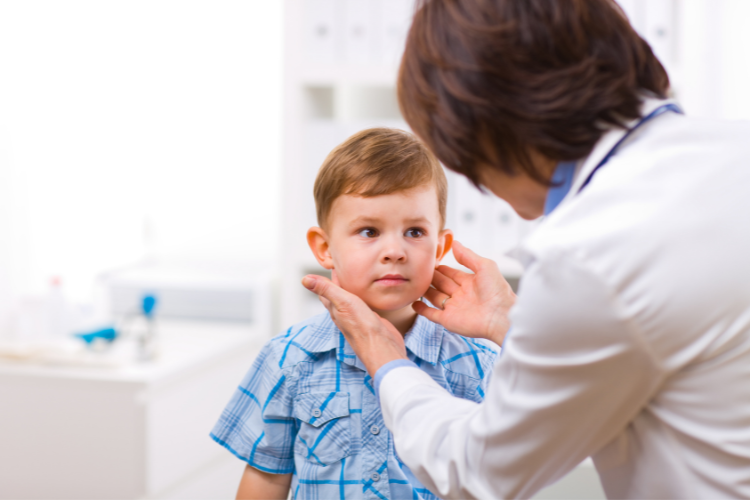Guest Post By Genevieve Kane, MSN, RN
When you think of strep throat, you may envision an angry sore throat and maybe a fever. However, while an active strep throat infection can cause painful symptoms, some individuals can have the bacteria in their throat and not get sick. These people are considered strep throat carriers. They carry the bacteria but without having any symptoms.

What Does it Mean If You're a Strep Throat Carrier?
It is estimated that, on average, anywhere from 12-20% of school-age children carry the bacteria that cause strep throat without feeling sick. It can be confusing to understand how someone can be a strep throat carrier without feeling ill. Here we break down what it means if you’re a strep throat carrier and the steps you can take to minimize spreading strep throat to others.
Strep Throat Carriers Have No Symptoms
The Centers for Disease Control and Prevention (CDC) explains that those with the bacteria that cause strep throat may test positive for strep throat but have no symptoms. While these individuals may carry the bacteria for strep, aka they’re a strep throat carrier, they are less likely to spread it.
It is also rare for strep throat carriers to experience complications associated with strep throat.
Strep Throat Carriers May Receive Unnecessary Antibiotics
If you or your child are a strep throat carrier, you could be unnecessarily prescribed antibiotics. For example, say you are a strep throat carrier with a sore throat. A virus, not strep throat, may be the reason for your sore throat.
If a healthcare provider tests you for strep throat, you will likely show a positive result and be prescribed antibiotics. However, antibiotics aren’t effective against viruses if that’s the cause of your sore throat.

Diagnosing Strep Throat May Be More Challenging
It’s important to know the symptoms of strep throat, but especially vital if you know you’re a carrier. This is because if you have a sore throat and you’re a strep throat carrier, you may test positive for strep throat, but another illness is the reason for your discomfort.
Common symptoms associated with strep throat include the following, per the CDC:
- Fever
- Pain with swallowing
- Red and swollen tonsils
- Red-appearing throat
- Pus on the tonsils
- Swollen neck lymph nodes
Other symptoms that aren’t as common, but can occur, include:
- Headache
- Stomach pain
- Nausea and vomiting
- Rash
Symptoms more consistent with a virus include a cough and runny nose. In these cases, even if you or your child test positive for strep throat as a carrier, it’s probably more likely that a virus is causing the sore throat, not strep.
In these cases, supportive care, such as rest, fluids, and the NozeBot to clear those little noses if they’re congested, can help your child feel better soon. However, always defer to your healthcare providers for advice. They may still feel it is in your or your child’s best interest to prescribe antibiotics since complications can happen from an untreated strep throat infection.
How to Prevent Strep Throat
Strep throat is highly contagious. And, even if you are a carrier and don’t have an active, symptomatic infection, it is still possible to spread the bacteria. Nemours Kids Health explains the importance of washing hands to prevent strep throat.
They describe how you are most likely to spread the infection when your symptoms are at their worst. However, it is possible to spread strep throat after you’ve been infected but before you start showing symptoms.
Strep throat is spread through daily activities such as sneezing, talking, and touching surfaces with bacteria. While you may not be able to control how close you are to someone when they sneeze, you can practice good hand hygiene and teach your child also to practice good hand hygiene to prevent some of the spread of strep throat.

Looking for more information similar to understanding what a strep throat carrier is? You’ll find these helpful:
- Work From Home Tips For Parents With A Sick Kid
- 5 Things to Consider Before Sending an Under-The-Weather Child to Daycare
- How To Not Get Sick During The Winter (Proven Pediatric ENT Recommended Hacks)
- Our Favorite Family Sick Day Movies
- How To Keep Your Newborn Healthy When You Have A Sick Child Or Parent At Home
Key Takeaways
It’s relatively common for school-age kids to be a carrier of strep throat. And if you or your child exhibit signs and symptoms of strep throat, a healthcare provider can help you determine if you have an active strep infection and need antibiotics.
Regardless of the cause of your or your child’s sore throat, there are several steps you can take to help the sore throat get better. These include tasty cold treats such as popsicles, pain-reducing medications such as acetaminophen or ibuprofen (also known as TylenolⓇ or MotrinⓇ) as appropriate, and plenty of rest and fluids.
If you’re unsure whether or not you should be seen, are concerned about symptoms, or are uncertain about a dose of a medication, reach out to a healthcare provider for advice. They’re there to help you feel better and are happy to answer any questions!
Genevieve Kane, MSN, RN, is a mother of four and a registered nurse with a background in pediatrics. When she's not working, you can find her cooking up tasty family dinners or keeping up with her kids on a hiking trail in her home state of Colorado.
The Nozebot is a battery-powered suction device designed to clear nasal congestion in babies and children.



